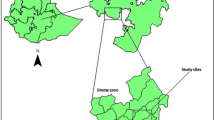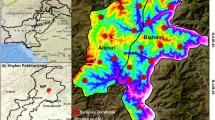Abstract
Poor waste disposal practices impinge on water quality. An assessment of the effect of domestic solid wastes disposal practices on microbial quality of drinking water sources was conducted in some rural communities of Akwa Ibom State, Nigeria. An ecological study design was adopted using quantitative methods and a multi-stage sampling technique for random selection of LGAs, communities, and households for the administration of questionnaires to 120 respondents within four communities. Microbiological analysis of water samples from various sources was also conducted. A total of 26 (43.3%) and 16 (26.7%) households in the coastal and upland areas respectively had waste disposal facilities, the remaining percentage dumped waste into rivers and nearby bushes. The majority of the coastal community dwellers defecate directly into water bodies or swamps due to a lack of faeces disposal facilities whereas all respondents in the upland areas had faeces disposal facilities though some were unimproved. The result of the microbial analysis showed that the coastal areas had a mean heterotrophic bacterial, coliform, and fungal count of 1.45(± 0.44) × 105 cfu/ml, 0.90(± 0.27) × 105 cfu/ml, and 1.75(± 0.50) × 105 cfu/ml while the upland areas had 1.34(± 0.55) × 105 cfu/ml, 0.65(± 0.36) × 105 cfu/ml, and 1.88(± 0.58) × 105 cfu/ml. There was no significant difference (P < 0.05) in microbial water quality between the coastal and upland areas besides the self-reported health problems. A moderate positive correlation was found between solid waste disposal practices and total bacterial count (r = 0.418**), and total coliform (r = 0.397**), P < 0.01. Most of the microorganisms isolated from drinking water in both settings were of public health importance. The result obtained from this study indicates very poor water quality in both settings. This implicates the poor solid waste disposal practices predominant in these communities and calls for immediate measures to secure the health of the rural community dwellers.

Similar content being viewed by others
Data availability
All the data generated or analysed during this study are included in this published article and are also available from the corresponding author on reasonable request.
References
Adelana, M. (2004). Water pollution by nitrate in a weathered/fractured basement rock aquifer: The case of Offa area, West central Nigeria In: Research basins and the hydrologic planning publisher: Balkema, A. A. (Taylor & Francis Group) Editors: Seiler K. P., Wu C., Xi R.
Agwu, J. O., & Njoku, C. (2017). Assessment of the effects of solid waste disposal on ground water quality in selected tubewells and boreholes in Kano Metropolis North West Nigeria. IOSR Journal of Applied Chemistry, 10(7), 56–60.
Bakobie, N., Ibrahim, A. R., & Duwiejuah, A. B. (2020). Sanitation practices and microbial quality of drinking water in open defaecation free and open defaecation communities in the Savelugu Municipality. Ghana J. Sci., 61(2), 1–12.
Barnett, H. L., & Hunter, B. B. (1972). Illustrated genera of imperfect fungi (3rd ed., p. 241). Burgess Publishing Co.
Blanton, E., Wilhelm, N., O’Reilly, C., Muhonja, E., Karoki, S., Ope, M., & Lantagne, D. (2014). A rapid assessment of drinking water quality in informal settlements after a cholera outbreak in Nairobi, Kenya. Journal of Water and Health, 13(3), 714–725. https://doi.org/10.2166/wh.2014.173
Brown, J. M., Proum, S., & Sobsey, M. D. (2008). Escherichia coli in household drinking water and diarrheal disease risk: Evidence from Cambodia. Water Science and Technology, 58(4), 757–763. https://doi.org/10.2166/wst.2008.439
Charan, J., & Biswas, T. (2013). How to calculate sample size for different study designs in medical research? Indian Journal of Psychological Medicine, 35(2), 121–126. https://doi.org/10.4103/0253-7176.116232
Egbinola, C. N. (2017). Trend in access to safe water supply in Nigeria. Journal of Environment & Earth Science, 7(8), 89–96.
Enebechi, J. C. & Ani, N. R. (2017). Solid waste disposal methods practiced by inhabitants of a typical Nigerian rural community. International Journal of Advanced Research, 5(Feb), 971–975.
Ejemot-Nwadiaro, R. I., Ehiri, J. E., Arikpo, D., Meremikwu, M. M., & Critchley, J. A. (2021). Hand-washing promotion for preventing diarrhoea. The Cochrane database of systematic reviews, 12(1), CD004265.
Felisilda, M., Judith, B., Asequia, S. J. C., Encarguez, J. R. P., & Galarpe, V. R. K. R. (2018). Sociodemographic of two municipalities towards coastal waters and solid waste management: The case of Macajalar Bay, Philippines. Environment Asia, 11(3).
Freitas, A. (2015). Water as a stress factor in sub-Saharan Africa. Population Development Review, 2005, 47.
Government of Akwa Ibom State. (2021). About Akwa Ibom. Ministry of Information and Strategy. https://akwaibomstate.gov.ng/about-akwa-ibom/
Hamzah, A. H. P., Anggoro, S., & Puryono, S. (2020). Solid waste management in coastal communities based on local wisdom “Meresik” in Tapak Kuda Village, the District of Tanjung Pura, Langkat. Prosiding ESEC, 1(1), 121–132.
Harrigan, W. F., & McCance, M. E. (1976). Laboratory methods in food and dairy microbiology: Academic Press Inc.(London) Ltd.
Ikurekong, E. E., Esin, J. O., & Udofia, E. P. (2008). Fecal waste disposal and environmental health status in a Nigerian coastal settlement of Oron. TAF Preventive Medicine Bulletin, 7(5), 336–363.
McGarvey, S. T., Buszin, J., Reed, H., Smith, D. C., Rahman, Z., Andrzejewski, C., & White, M. J. (2008). Community and household determinants of water quality in coastal Ghana. Journal of Water & Health Affairs, 6(3), 339–349.
Okon, A. J., Eja, M. E., & Kalu, R. E. (2017). A study of access to sanitation profiles of rural upland and coastal communities of Akwa Ibom State, Nigeria. Global Journal of Pure and Applied Sciences, 23, 207–212. https://doi.org/10.4314/Gjpas.V23i2.1
Okon, A. J., Olaniran, N. S., Kalu, R. E., & Zacchaeus, U. (2018). A study of access to safe drinking water in rural upland and coastal communities of Akwa Ibom State, Nigeria. International Journal of Applied Environmental Sciences, 7, 605–619.
Omole, D. O., & Isiorho, S. (2011). Waste management and water quality issues in coastal states of Nigeria: The Ogun State experience. Journal of Sustainable Development in Africa, 13(6), 207–217.
Ukpong, I. E., & Udofia, E. P. (2011). Domestic solid waste management in a rapidly growing Nigerian City of Uyo. Journal of Human Ecology, 36(3), 229–235. https://doi.org/10.1080/09709274.2011.11906441
UNICEF. (2020). New survey reveals progress and gaps in Nigerians’ access to water, sanitation and hygiene services. UNICEF Nigeria 2020. https://www.unicef.org/nigeria/stories/new-survey-reveals-progress-and-gaps-nigerians-access-water-sanitation-and-hygiene-services
Usman, M. A., Gerber, N., & Pangaribowo, E. H. (2017). Drivers of microbiological quality of household drinking water — A case study in rural Ethiopia. Journal of Water and Health, 16(2), 275–288. https://doi.org/10.2166/wh.2017.069
United Nations Development Program. (2015). Domestic solid waste. http://www.undp.org/content/dam/undp/library/corporate/fast-facts/english/FF-WasteManagement.pdf
Vandenbroucke, J. P., Von Elm, E., Altman, D. G., Gøtzsche, P. C., Mulrow, C. D., Pocock, S. J., & Initiative, S. (2007). Strengthening the reporting of observational studies in epidemiology (STROBE): Explanation and elaboration. PLoS Medicine, 4(10), e297.
Water Research Center. (2020). Faeces coliform bacteria in water. https://www.knowyourh2o.com/outdoor-4/faeces-coliform-bacteria-in-water
Author information
Authors and Affiliations
Corresponding author
Ethics declarations
Ethics approval
Before the commencement of this study, a letter of introduction was obtained from the Department of Public Health University of Calabar and subsequently, ethical clearance was sought and obtained from the Planning, Research and Statistics Department of the Akwa Ibom State Ministry of Health.
Informed consent
Informed consent was also sought for and obtained from the respective village heads and household respondents.
Patient public involvement
The research questions were developed in such a way as would be easily understood by the respondents, no invasive questions were asked, and respondents who declined participating in the study were not coaxed. The public got involved in the study during the pre-testing of the instrument and the main study as either household heads or next available adult member of households were administered the study questionnaire. The result of the water quality analysis was duly communicated to the respective village heads in order to encourage community members to adopt some form of water treatment before consumption as the quality of most of the water sources was found to be poor and unsafe.
Conflicts of interest
The authors declare that they have no conflicts of interest.
Additional information
Publisher's Note
Springer Nature remains neutral with regard to jurisdictional claims in published maps and institutional affiliations.
Rights and permissions
Springer Nature or its licensor holds exclusive rights to this article under a publishing agreement with the author(s) or other rightsholder(s); author self-archiving of the accepted manuscript version of this article is solely governed by the terms of such publishing agreement and applicable law.
About this article
Cite this article
Okon, A.J., Inyang, I.B., Ugbe, U.MJ. et al. Effect of domestic solid waste disposal practices on quality of drinking water sources in some rural communities of Akwa Ibom State, Nigeria. Environ Monit Assess 194, 799 (2022). https://doi.org/10.1007/s10661-022-10435-8
Received:
Accepted:
Published:
DOI: https://doi.org/10.1007/s10661-022-10435-8




